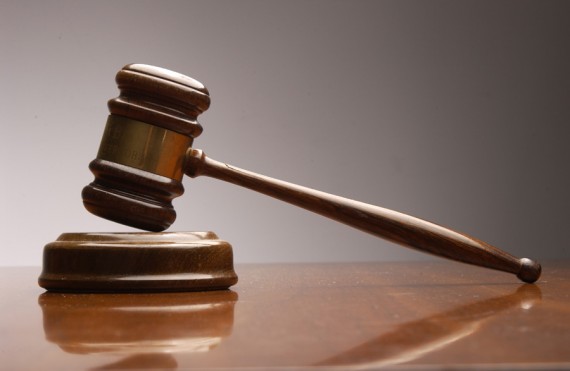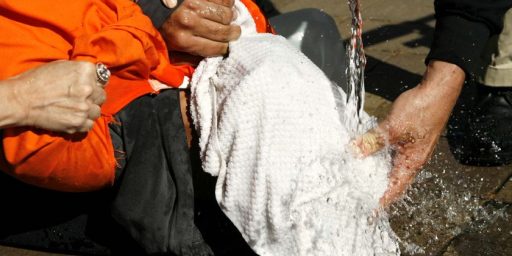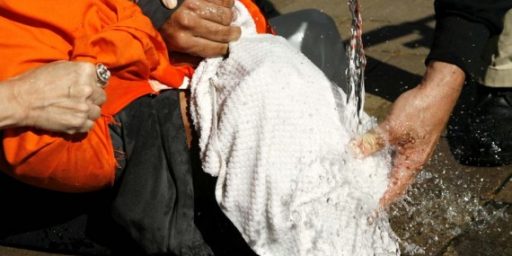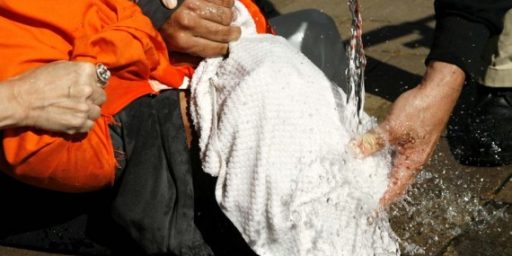Obama Wins Executive Secrecy Case
The Obama administration has persuaded the nation's most liberal appellate court that the executive branch's right to secrecy trumps the rights of people claiming they were tortured by the United States Government.
The Obama administration has persuaded the nation’s most liberal appellate court that the executive branch’s right to secrecy trumps the rights of people claiming they were tortured by the United States Government.
A federal appeals court on Wednesday ruled that former prisoners of the C.I.A. could not sue over their alleged torture in overseas prisons because such a lawsuit might expose secret government information.
The sharply divided ruling was a major victory for the Obama administration’s efforts to advance a sweeping view of executive secrecy powers. It strengthens the White House’s hand as it has pushed an array of assertive counterterrorism policies, while raising an opportunity for the Supreme Court to rule for the first time in decades on the scope of the president’s power to restrict litigation that could reveal state secrets.
By a 6-to-5 vote, the United States Court of Appeals for the Ninth Circuit dismissed a lawsuit against Jeppesen Dataplan Inc., a Boeing subsidiary accused of arranging flights for the Central Intelligence Agency to transfer prisoners to other countries for imprisonment and interrogation. The American Civil Liberties Union filed the case on behalf of five former prisoners who say they were tortured in captivity — and that Jeppesen was complicit in that alleged abuse.
Judge Raymond C. Fisher described the case, which reversed an earlier decision, as presenting “a painful conflict between human rights and national security.” But, he said, the majority had “reluctantly” concluded that the lawsuit represented “a rare case” in which the government’s need to protect state secrets trumped the plaintiffs’ need to have a day in court.
While the alleged abuses occurred during the Bush administration, the ruling added a chapter to the Obama administration’s aggressive national security policies.
Its counterterrorism programs have in some ways departed from the expectations of change fostered by President Obama’s campaign rhetoric, which was often sharply critical of former President George W. Bush’s approach.
Among other policies, the Obama national security team has also authorized the C.I.A. to try to kill a United States citizen suspected of terrorism ties, blocked efforts by detainees in Afghanistan to bring habeas corpus lawsuits challenging the basis for their imprisonment without trial, and continued the C.I.A.’s so-called extraordinary rendition program of prisoner transfers — though the administration has forbidden torture and says it seeks assurances from other countries that detainees will not be mistreated. [Emphases mine.]
John Cole is outraged and Glenn Greenwald is outraged that more people aren’t outraged. And they’re right. But this was all entirely predictable. Indeed, I predicted it.
Whatever convictions presidential candidates hold as civilians, they invariably become quite enamored of executive power once they settle into the Oval Office chair. And that’s doubly true in matters of “national security.” The bottom line is that they’re charged with overseeing the military and intelligence apparatus, are inundated with daily briefings on the dire threats facing the country, and soon become willing to do pretty much whatever it takes to deal with it as they see fit.
Soon, Congress is seen as an annoyance to be overcome, not a coordinate branch there to provide necessary checks and balances. And the technicalities and niceties of the law are an obstacle to going after the bad guys. So, presidents push the envelope as far as they can, daring anyone to stop them.
And protecting their own ability to define the limits of their power naturally means defending all but the most wretched excesses of their predecessors. Precedent and all that.
The courts are the ultimate check on this tendency. But they’re extremely loathe to tell presidents that the actions they’re taking ostensibly to safeguard the country from evil-doers go too far. And even the process drags on so long that presidents have years of latitude before facing any restraint.
Andrew Sullivan it “radicalized” by all this.
If we are to recover as a nation under law rather under a prince, it will not be through the channels of the two major parties or through any president acceptable to the mainstream of either party. It will require a citizenry so enraged and protective of its core liberties against this security Leviathan that it compels dismantling this machinery and exposing it to the light of day – not recklessly, not abruptly, but by close examination, judicial review, press inquiry, protest. There are legitimate trade-offs between national security and liberty. But the protection of war criminals where no secrets are at stake except the scandal of torture itself is not one of them. Alas, there are few such citizens around.
Hyperbole aside, this is right. But citizens are very deferential to their presidents on security matters. Unless Obama or one of his successors starts willy nilly rounding people up in the middle of the night, there simply isn’t going to be any serious revolt over this.







Regardless of how predictable this result was, the fact of it is absolutely vomit-inducing.
Very, very disappointing.
Aren’t these foreign nationals? I think it’s worth mentioning citizen rights have not been compromised by this case. Outrage? Not here.
There is going to be outrage by the liberal left over this, Bush can’t get away with this! Oh sorry, nothing to see here it’s Obama getting away with this so it is fine. mpw
You should look at the history of United States v. Reynolds, 345 U.S. 1 (1953), the case that established the State Secrets Doctrine. It turns out, 50 years later after the materials surrounding the case were declassified, that there were no state secrets at stake, just incompetence. The case that established the power was a fraud, and there in lies the problem with extra legal powers. The constitution is all about balancing power. You know what they call the form of government where extra legal power is concentrated in the executive, don’t you?.
Come on, Plunk. This has nothing to do with “citizen’s rights” being implicated. Due Process is guaranteed to all PERSONS. That these were foreign nationals is irrelevant.
It was a civil suit against the company that provided flight planning and logistical support for the air flights in which the plaintiffs were extraordinarily rendered.
If there is any problem here, it is with the legislative branch for not lifting sovereign immunity against the U.S. government to allow these suits to be brought against the government itself, and not against tertiary private parties.
I think the defendant had a fair claim that it’s ability to defend itself and get a fair trial was going to be impeded by lack of access to the secret documents.
The dissent seems to recognize this is a problem, but complains that throwing the case out is premature at this stage (prior to finding out what evidence can be obtained).
MPW : Look up there’s outrage. Hell if you’re attention span allows it you could even read the rest of this post.
This is incredibly disappointing and just another step Obama is taking to further some of Bush’s worst policies..
Ben, I’m sorry but I see things differently. Sovereign nations are formed as associations of citizens in order to advance and protect the rights of the citizens. I’m concerned more with violations of our citizen’s rights before I’m concerned with the rights of foreigners. In this case it’s not even about their rights but about those suing a bit player in transporting them. It’s all silliness.
In my mind no knock raids, property rights, bureaucratic abuse, and aggressive police training pose threats to our own rights and safety that are a bigger problem. I see your point but with limited outrage capability I have to prioritize mine.
Reading further into the opinon, I think I have to defend the Obama administration. They re-reviewed the issue of whether to claim secrecy based upon Holder’s new standsards from a September 23, 2009. I imagine that Andrew Sullivan and company were supportive of the new standards, but using the new standards the administration found secrecy warranted and independently applying those standards the court agreed:
“They [the new standards] also mandate that the Department of Justice “will not defend an invocation of the privilege in order to: (i) conceal violations of the law, inefficiency, or administrative error; (ii) prevent embarrassment to a person, organization, or agency of the United States government; (iii) restrain competition; or (iv) prevent or delay the release of information the release of which would not reasonably be expected to cause significant harm to national security.” Id. at 2. That certification here is consistent with our independent conclusion, having reviewed the government’s public and classified declarations, that the government is not invoking the privilege to avoid embarrassment or to escape scrutiny of its recent controversial transfer and interrogation policies, rather than to protect legitimate national security concerns.”